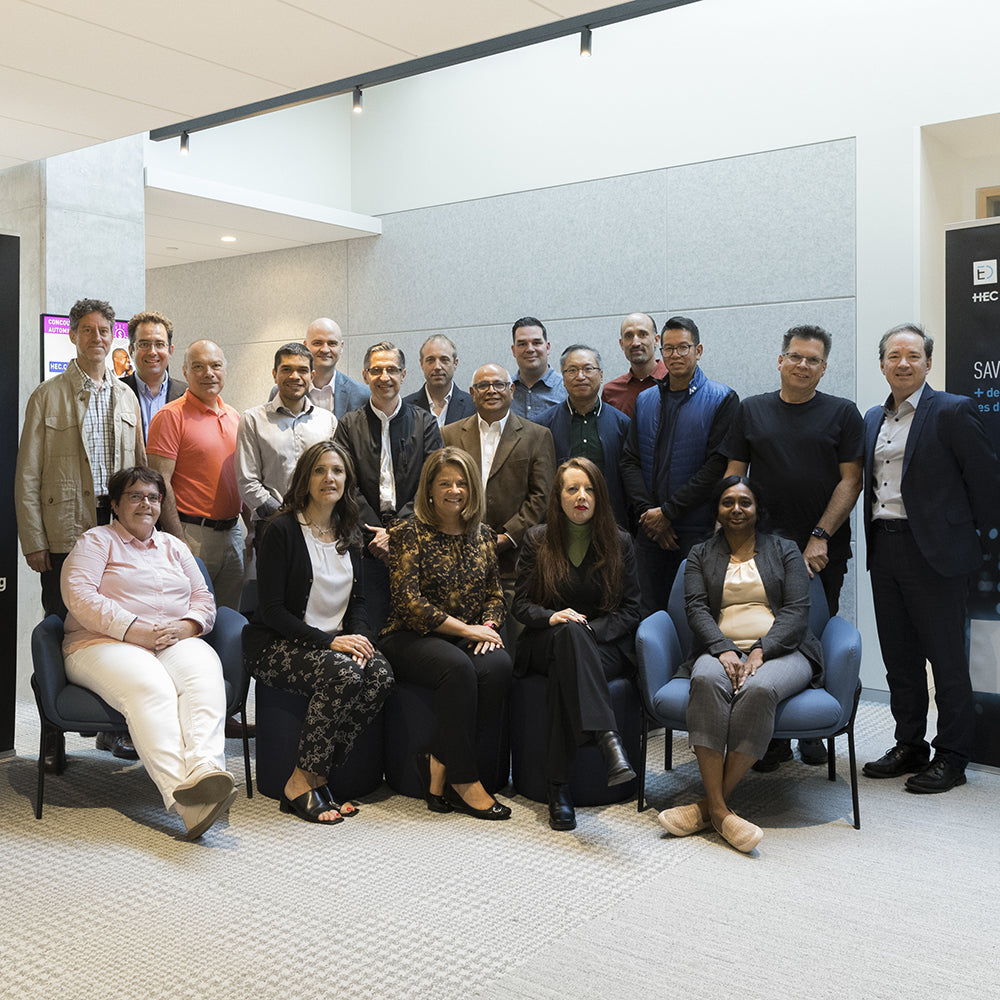2024: Four new essentials business skills

March 19, 2024
Now, like never before, businesses have to equip their people to face a number of emerging challenges, starting with those related to artificial intelligence and ethics. Their success depends on it.
The upheavals we are seeing on the social, financial, climate and technological front are here to stay. To remain on track, it is important for organizations to cultivate new skills in their teams. This starts at the top, with leaders who can see beyond today’s issues and envision new ways forward.
1 - Empathetic leadership
“In 2024, we are seeing a shift from an ego-driven to a team-driven mindset,” Olivier Foucher, Director, Corporate Programs, at Executive Education HEC Montréal, said enthusiastically. This emerging new leadership style is more people-oriented and collaborative, with an increased focus on engagement. Leaders have to create workspaces where teams feel like they can stick their neck out. Foucher believes that safe spaces should also be brave spaces.
For experienced leaders as well as professionals who climb the corporate ladder without management training, embracing this position requires openness, introspection and support. “You need to start by working on yourself and developing your emotional intelligence if you want to be an effective leader,” Foucher said. These efforts, he feels, have the potential to reap many rewards: businesses that adopt an empathetic leadership style attract top talent and inspire teams to give the best of themselves. Against the backdrop of a labour shortage, this is one key businesses can’t afford to do without.
2 - Ethical practices
Research by Martineau, Decety and Racine (2020)[1] suggests that empathy also plays a crucial role in ethical decision-making. It provides a better understanding of different points of view and complex, emotionally charged contexts.
Issues that have emerged in recent years — financial fraud, the climate crisis, the #MeToo movement and others — have justifiably put new pressure on top brass. Generations Y and Z in particular want to work for businesses that have a moral compass and that can challenge their own status quo. This is why it is important to invest in an ethical, empathetic business culture.
Developing ethical practices is becoming essential, and not just to attract and retain talent. Environmental, social and governance (ESG) issues are also a priority for investors, not to mention consumers. But adopting a diversity, equity and inclusion (DEI) policy is not enough. Implementing ethical practices is a multifaceted process, and one that requires careful reflection.
Boards can play a key role in promoting ethics by pressing executive committees to take action, and they in turn can influence operations. “With ethical practices, the idea is to do everything with integrity,” Foucher said. “A board of directors has the power to set things in motion.”
3 - Artificial intelligence
It is impossible to ignore artificial intelligence (AI), which has become a major issue for today’s businesses. Not only are there a range of complex tools to choose from, but they also involve large sums of money. Decision makers can sometimes inherit projects that are worth millions of dollars for which they have to select AI solutions.
The capacity to evaluate these solutions is critical. Managers need to be able to fully understand their value and impact. Simply following market trends is not an option.
By learning to make better decisions for their business model, managers can determine how to accommodate the growing use of AI, which is now a reality in many workplaces.



4 - Data protection
Protecting personal data is one of the top challenges faced in cybersecurity. In Quebec, since September 2023, Law 25 has required that businesses meet strict standards to reinforce data protection and the resilience of IT systems — with stiff fines for those that fail to do so.
According to Foucher, data protection has to be a strategic organization-wide effort. He maintains that appointing a chief security officer isn’t the answer. “Everyone has to contribute,” he said. By ensuring that their teams are well informed, leaders make their business more resilient to digital
threats.
Achieve excellence with custom training at Executive Education HEC Montréal
Executive Education HEC Montréal’s custom training solutions are designed specifically to respond to the changing needs of businesses of all sizes, covering key areas such as leadership, strategic management, professional ethics, digital intelligence and cybersecurity. A dedicated pedagogical team will conduct an in-depth analysis and make recommendations about adapting an existing program or building a custom course in line with market trends and best practices.
Custom training programs are immersive and flexible. Instruction can be delivered on site at the client’s place of business, on campus at HEC Montréal, online or in hybrid mode. Every program, regardless of format, features highly qualified instructors and a hands-on approach that is directly relevant to the client’s workplace. “What we promise is that people can start using tomorrow what they learn today,” Foucher said.
For example, Executive Education HEC Montréal worked closely with Médecins francophones du Canada to tailor the MBA Essentials program in order to meet the needs of doctors who are managers or interested in management. One of the participants, Dr. Nicole LeBlanc, a Francophone pediatrician and Regional Chief of Staff of New Brunswick’s Vitalité Health Network, found her learning experience inspiring:
“This customized program is an excellent way to learn about new management and leadership tools. This style of continuing education has so many advantages, like being able to converse with other doctors in your first language and share similar experiences. It’s such a great program, and you’re all there for the same reason — you want to improve patient care and provide the best-quality services you can.”
— Dr. Nicole LeBlanc
[1] Martineau, J. T., Decety, J. & Racine, E., "The social neuroscience of empathy and its implication for business ethics", in Martineau, J. T. & Racine, E., Organizational Neuroethics: reflections on the contributions of neuroscience to management theories and business practices, Advances in Neuroethics, Berlin, Springer, 2020, p. 167-189.
➲ To explore Executive Education HEC Montréal's custom corporate solutions, visit this section of our website.
